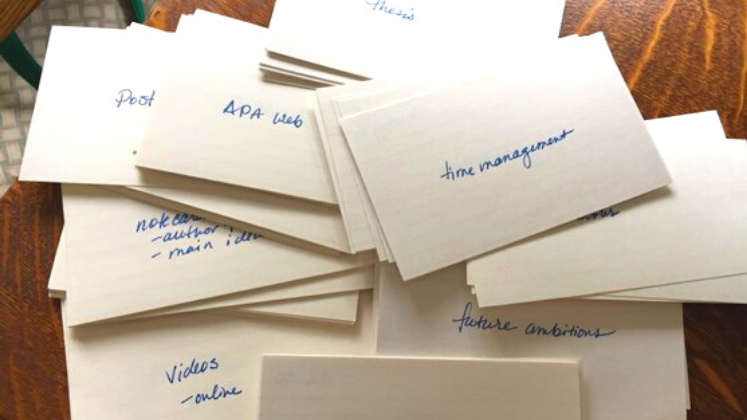To adapt the well-known saying: there are few constants in academia other than death and deadlines. Drawing on their experience as a writing coach and author, Delia Lloyd presents five strategies for getting writing done when you really need to.
I was scrolling through my Twitter feed the other day when a post stopped me dead in my tracks. It was a link to a café in Japan where you cannot enter the premises without committing to getting a certain amount of writing done. It is *literally* a manuscript deadline cafe!
I immediately found that this establishment was a writer’s version of marmite. My instant reaction was “Sign me up!” A friend exclaimed: “That is my definition of hell.”
Love or hate deadlines, most of us need to hit them. As someone who coaches writers for a living—many of whom are PhD students or academics—I am often in the position of helping people get from A to B under time pressure.
Here are five tips I find myself returning to time and again when looking to help authors move from writing to written:
Figure out when you’re most productive.
My first piece of advice is to identify the time of day when you are most focused and fertile. For some people like me, it’s the wee hours. (I’m a proud member of the @5amwritersclub.) For others, it’s late at night. I had a professor in graduate school who did all of his writing between 10 pm and 3 am. A colleague once quipped that “Barry keeps banker’s hours…in Hawaii!” It doesn’t matter when it is. Identify that period and make it sacred.
Recognise and Eliminate Distractions.
As the phenomenally prolific Joyce Carol Oates observed, a writer’s biggest enemy is distraction. That’s obvious, but something about the way she framed it really resonated for me. The trick is to identify whatever it is that distracts you—your phone, your laundry, your endless piles of admin—and put that aside for a set period of time. This ability to focus without distraction on a cognitively challenging task (like, say, your research!) is exactly how Cal Newport defines “Deep Work.” And it’s exactly why so many successful people—like Alfred Einstein, Toni Morrison, and Bill Gates, to name a few—have gotten so much done. Top tip: Unless you’re looking after a small child, someone who’s very ill, or you absolutely *must* be available for that critical phone call from your GP, you neither want nor need your phone anywhere near you while you’re writing. Put it in another room and check it when time’s up.
Use tools to help you focus.
I don’t think technology is the answer to all productivity problems. But I do think that a little technology can go a long way if you need help focusing, particularly if you’re struggling to hit a writing deadline. I know people who swear by so-called focus apps, which (temporarily) shut down all of the apps on your computer so that you can only look at the document in front of you. Me? I’m old school. I’m a big fan of timers. (Here’s mine. It ain’t cheap, but I use it every day!) When I’m concerned that just moving location isn’t enough to switch off distractions (see #4), I set a timer to make sure that I write for at least an hour/two hours/etc.
Change your location.
Whenever I need to do my own deep work—i.e., design a workshop, edit someone’s paper, write a blog—I always move away from my desk and sit on my bed. Interestingly, I’m still using the same laptop with all of my email, social media accounts and assorted collaboration tools there for the asking. But something about making that five-foot walk from my desk to my bed signals to my brain that I am not going to get caught up in any of my normal distractions. At my suggestion, one of my clients now moves to a table on the far side of her office whenever she needs to write. You may be someone who needs to enter a “third space” like a cafe (or even a deadline cafe) in order to get your mojo flowing. Susan Cain, the best-selling author of Quiet: The Power of Introverts in a World that Can’t Stop Talking, maintains that libraries or cafés are the perfect writing space for introverts because you feel the presence of other people, but you’re also free to be working on your own.
Set up Your Own Writing Retreat.
Here’s an idea I’ve not yet tried, but as soon as I read about it, I knew it was for me: create your own writing retreat…at home. This is what Merrill Hammond did when she realised that, like most of us, she couldn’t quite afford that proverbial getaway-by-the sea/mountainside cabin/fill-in-the blank where all of your needs are tended to and you simply show up to write. So she did it herself, interspersing exercise, meals out and journaling about the retreat alongside larger chunks of time devoted to nothing but writing. Brilliant idea. Bonus? You get to name your own retreat!
As you can see, I’m a collector of writing tips and constantly looking for new ones to help me hit deadlines. Feel free to share some of your favourite strategies in the comments section. How about you? What do you do when you need to hit a writing deadline?
The content generated on this blog is for information purposes only. This Article gives the views and opinions of the authors and does not reflect the views and opinions of the Impact of Social Science blog (the blog), nor of the London School of Economics and Political Science. Please review our comments policy if you have any concerns on posting a comment below.
Image Credit: Oladimeji Ajegbile via Unsplash.









Check Brian Martin’s fork on all this. all online at https://www.bmartin.cc/pubs/edu.html
Brian Martin. A program for writing. Australian Universities’ Review, vol. 62, no. 2, 2020, pp. 83-86. Experiences with the high-output writing program.
Brian Martin. Writing regularly as a thesis-completion strategy. In Tanya Machin, Marc Clara and Patrick Danaher (eds.), Traversing the Doctorate (Cham: Palgrave Macmillan, 2019), pp. 179-192. Insights from supervising PhD students.